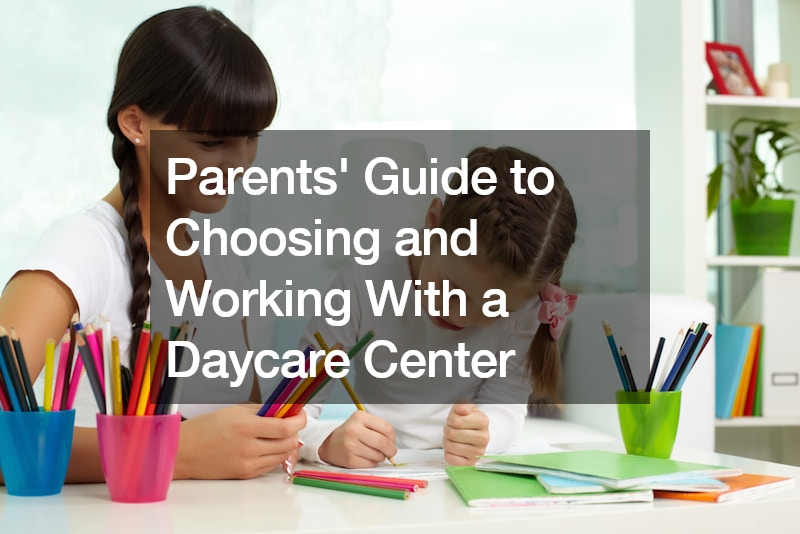Choosing a daycare center for your child is one of the most significant decisions parents will make. The right daycare can provide a nurturing, educational, and safe environment for children, but the process of finding and working with a daycare center can be overwhelming. This guide aims to simplify that process by outlining essential factors to consider and offering practical tips for establishing a successful partnership with your chosen daycare center.
Choosing the Right Daycare Center
Safety and Licensing
Ensure Licensing: Verify that the daycare center is licensed and accredited by relevant authorities. This ensures that the facility meets specific safety and quality standards.
Security Measures: Look for tangible safety features such as security cameras, secure entry points, fire alarms, and sprinkler systems. The presence of these measures indicates a commitment to child safety.
Teacher-to-Child Ratios
Optimal Ratios: Smaller teacher-to-child ratios ensure that each child receives adequate attention and care. For infants, a ratio of 3-4 babies per teacher is ideal. For older children, the acceptable ratio can be higher but should still allow for personalized care.
Curriculum and Activities
Educational Philosophy: Understand the daycare center’s educational approach. Whether it’s play-based, Montessori, or a structured curriculum, choose a philosophy that aligns with your child’s needs and your family’s values.
Daily Activities: Look for a balanced mix of activities that promote cognitive, emotional, and physical development. This can include arts and crafts, storytime, outdoor play, and structured learning sessions.
Facility and Environment
Age-Appropriate Resources: Ensure that the daycare center has appropriate furniture, toys, and learning materials for different age groups. This helps in creating a safe and engaging environment for children of all ages.
Cleanliness and Maintenance: A clean, well-maintained facility is crucial. Regular cleaning routines and maintenance schedules should be in place to ensure a hygienic environment.
Staff Qualifications
Qualified Staff: Teachers and caregivers should have relevant qualifications and training in early childhood education and first aid. Their experience and approach to childcare can significantly impact your child’s development.
Background Checks: Ensure that all staff members have undergone thorough background checks. This is essential for the safety and security of the children.
Communication and Transparency
Open Communication: A good daycare center will maintain regular communication with parents. This includes updates on your child’s progress, daily activities, and any incidents or concerns.
Transparency Policies: Transparent policies regarding fees, schedules, and curriculum changes are important. Clear communication about these aspects helps in building trust between parents and the daycare center.
Parent Reviews and Recommendations
Seek Recommendations: Talk to other parents and read online reviews to get a sense of the daycare center’s reputation. Personal experiences can provide valuable insights into the quality of care and education offered.
Working With Your Chosen Daycare Center
Establishing a Partnership
Building Relationships: Develop a positive relationship with the daycare staff. Regularly communicate with teachers and caregivers to stay informed about your child’s experiences and progress.
Participate Actively: Participate in daycare events, parent-teacher meetings, and volunteer opportunities. This involvement shows your commitment and helps you stay engaged with your child’s daycare experience.
Setting Expectations
Clear Expectations: Discuss your expectations regarding your child’s care, learning, and behavior management. Clear communication helps in aligning your expectations with the daycare center’s policies.
Consistent Routines: Work with the daycare to establish consistent routines for your child. This includes nap times, meal times, and learning activities, which can help in creating a stable environment for your child.
Handling Issues and Concerns
Addressing Concerns Promptly: If any issues or concerns arise, address them promptly with the daycare staff. Open and respectful communication is key to resolving problems effectively.
Feedback Mechanisms: Provide constructive feedback to the daycare center. This can help in improving the quality of care and addressing any specific concerns you might have.
Supporting Your Child’s Transition
Smooth Transitions: Help your child adjust to the daycare environment by gradually increasing their time spent at the center. Familiarize them with the setting and routines to make the transition smoother.
Emotional Support: Provide emotional support to your child, especially during the initial days. Reassure them about the new environment and stay positive about the change.
Evaluating Progress
Regular Assessments: Regularly assess your child’s development and progress at the daycare center. Discuss these assessments with the teachers to understand your child’s strengths and areas for improvement.
Adjusting as Needed: Be open to making adjustments if needed. If the daycare center is not meeting your expectations or your child’s needs change, consider exploring other options.
Choosing and working with a daycare center requires careful consideration and active participation. By focusing on safety, quality, communication, and continuous evaluation, you can ensure that your child receives the best possible care and education in a nurturing environment. Remember, the right daycare center not only supports your child’s development but also provides peace of mind for you as a parent.
.

